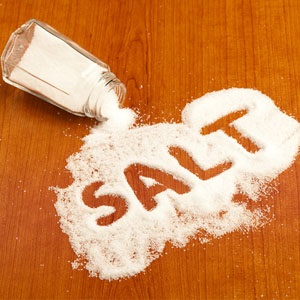
Producers under pressure to comply and medical fraternity celebrates as health ministry’s new laws on lowering salt in basic food kick in on June 30
Food producers are racing against the clock to meet the deadline for salt reduction in the most basic foodstuff products.
They have until June 30 to ensure that salt content complies with new legislation, particularly with regard to cereals, bread, butter spreads, gravies, processed meats, soups and crisps.
The regulation was published in the Government Gazette in 2013, allowing food producers three years to comply.
According to expert estimates, South Africans consume on average more than 40g of salt a day. Much of this intake comes from hidden salts in products targeted by the new law.
This is eight times higher than the recommended average by the World Health Organisation, which recommends salt intake of less than 5g a day for adults and far lower for young children.
According to the legislation, salt content in bread will have to be reduced from 650mg to 400mg per two slices. All breakfast cereals and porridges – be they ready-to-eat, instant or cook-up – will have to contain no more than 500mg of salt in a 100g serving.
Pioneer Foods, one of the biggest local producers of bread and breakfast cereals, said it was all systems go. The company produces Sasko bread and Bokomo breakfast cereals, including ProNutro and Weet-Bix.
Spokesperson Leanne Koopman told City Press this week that Pioneer Foods started working towards these objectives more than two years ago.
“Reductions were implemented gradually to allow consumers’ palates to adjust. All breakfast cereals and bread products produced today are already compliant with the 2016 sodium targets, effective June 30.
“Many of the related products are already compliant with the 2019 targets,” she said, referring to further reductions that have been legislated for 2019.
The new regulation on salt content in foods is one of the measures introduced by government in a bid to curb the rapidly increasing number of people suffering from lifestyle diseases.
At the time of signing the legislation in 2013, Health Minister Aaron Motsoaledi said salt was one of the biggest contributors to the nation’s growing burden of non-communicable lifestyle diseases. Other worrying factors cited by the health department include excessive consumption of sugar and alcohol, as well as smoking.
He said that about 40% of South Africans’ daily intake of salt came from bread, which was a staple food for many families in the country.
In September 2012, researchers from Wits University published a study showing that reducing salt content in food had the potential of preventing up to 7 400 cardiovascular deaths a year.
The study went on to show that the reduction of salt content in foods could prevent about 2 000 fatal and 2 300 nonfatal stroke attacks each year, which could translate into an annual saving of R300 million in direct costs when it came to treating strokes. It found that in 2010, government forked out at least R76 000 per stroke sufferer.
Dr Anchen Laubscher, medical director at Netcare, described the health department’s policy in governing salt content as “a laudable initiative”.
“South Africans should embrace this opportunity to avert this threat. Salt causes the body to retain more water, potentially raising blood pressure and placing strain on the kidneys, arteries, heart and other vital organs,” she said.
“For many individuals, high levels of salt in their diet can substantially increase the risk of developing high blood pressure [hypertension], which, in turn, can lead to life-threatening illnesses such as heart disease or a stroke. These are leading causes of death and disability in South Africa.”
Salt is one of the additives that not only add flavour to food but also preserve it. The challenge, Laubscher said, was that salt was often consumed in large amounts because of the hidden salts added by producers.
“Many of the foods we purchase already contain high levels of sodium and often we add more salt to our food before eating it. High levels of salt are particularly evident in bread, processed foods, prepackaged foods and takeaways,” she explained.
Dr Bobby Ramasia, principal executive officer for the Bonitas medical scheme, emphasised that the freedom to add salt to one’s bowl of noodles or cup of soup will always exist. “However, the growing reliance on processed and fast foods that contain higher amounts of salt can be seen in the high rate of obesity and related lifestyle diseases prevalent in South Africa,” he said.
TALK TO US
Do you support government’s new laws to reduce salt content in basic foodstuff?
SMS us on 35697 using the keyword SALT and tell us what you think. Please include your name and province. SMSes cost R1.50




 Publications
Publications
 Partners
Partners








